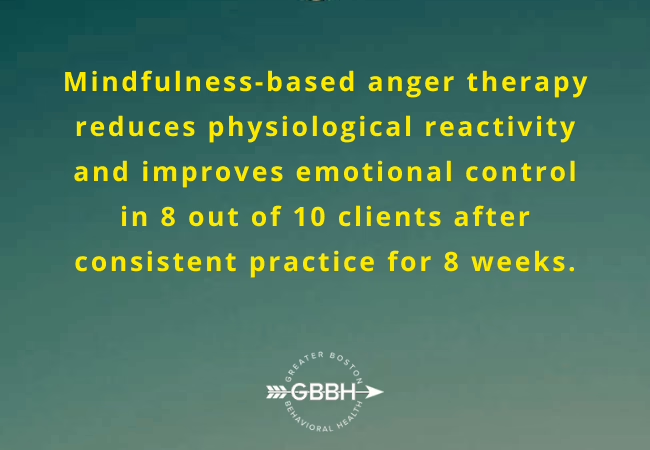Anger, when managed properly, is a healthy and natural human emotion. It alerts us when something is wrong, helps us defend our values, and drives us to take action. But when anger becomes chronic, explosive, or difficult to control, it can damage relationships, sabotage careers, impact physical and mental health, and even lead to legal trouble.
That’s where anger management therapy comes in.
At Greater Boston Behavioral Health, we use a comprehensive, personalized approach to Anger Management Therapy in Boston that equips clients with tools to identify triggers, manage emotional intensity, and respond in healthier ways. Whether you’re participating in outpatient sessions or enrolled in a Partial Hospitalization Program in Boston, our goal is to empower you with sustainable coping strategies and long-term emotional resilience.
Below, we break down the most effective techniques used in anger management therapy, explain how they work, and how they’re applied across our treatment programs.
Understanding the Root of Anger
Before diving into the techniques, it’s important to understand that anger is often not the core problem. It’s usually a symptom—a secondary response to:
- Deep emotional pain
- Anxiety or fear
- Repressed sadness
- Feelings of powerlessness
- Trauma or neglect
That’s why successful anger management requires more than just learning how to “stay calm.” It requires learning how to process emotions, retrain thought patterns, and heal from unresolved wounds. Our Mental Health Programs in Boston are designed to do just that.
Why Do People Need Anger Management Therapy?
Anger becomes a problem when it:
-
Leads to frequent arguments or violence
-
Causes problems at work, school, or home
-
Makes you feel guilty or ashamed afterward
-
Is accompanied by anxiety, depression, or trauma
-
Results in legal or disciplinary consequences
Uncontrolled anger is often a symptom of deeper issues such as trauma, stress, unresolved grief, or co-occurring mental health conditions. That’s why Anger Management Therapy is most effective when integrated into comprehensive Mental Therapy Programs in Boston, which offer emotional support, behavioral skill-building, and—when needed—Psychiatric Care in Boston.
1. Cognitive Behavioral Therapy (CBT)
Cognitive Behavioral Therapy is one of the most evidence-based methods for treating anger. It helps clients identify distorted thinking that fuels anger, such as:
- Catastrophizing (“This always happens to me!”)
- Mind reading (“They did this just to make me mad.”)
- All-or-nothing thinking (“If I don’t win this argument, I’m weak.”)
How CBT helps:
- Clients learn to catch these thoughts early and replace them with more balanced thinking.
- Behaviorally, they begin to act from a place of thoughtfulness rather than emotional impulse.
- Over time, CBT helps break the cycle between triggering thoughts and angry reactions.
At Greater Boston Behavioral Health, CBT is a core part of therapy in both outpatient settings and structured programs like our Intensive Outpatient Program in Boston and Residential Treatment Program in Boston.
2. Dialectical Behavior Therapy (DBT)
DBT is a specialized therapy designed to help individuals who experience intense emotional responses, particularly those with mood disorders, trauma histories, or interpersonal conflicts.
Key DBT modules include:
- Mindfulness: Teaching clients to slow down and stay present in emotionally charged moments.
- Emotion Regulation: Helping clients reduce their emotional vulnerability and build balance.
- Distress Tolerance: Giving clients tools to survive overwhelming emotions without acting impulsively.
- Interpersonal Effectiveness: Strengthening communication, boundary-setting, and self-respect.
DBT is particularly valuable for clients in our Partial Hospitalization Program in Boston, where they receive daily coaching and group work to internalize these skills.
3. Anger Mapping and Trigger Identification
A major breakthrough in anger management comes when clients can pinpoint their personal triggers. These may include:
- Feeling disrespected or ignored
- Unmet expectations or broken promises
- Lack of control in situations
- Flashbacks or associations from past trauma
Therapists guide clients through anger mapping, a process that identifies:
- The events that trigger anger
- The thoughts and beliefs that follow
- The physical and emotional responses that build up
Once clients can anticipate their triggers, they are empowered to intervene early and redirect their energy.
4. Mindfulness and Relaxation Training
Anger is not only mental—it’s physical. Clients often describe:
- Heart racing
- Tension in the chest or jaw
- Feeling hot or flushed
- Shaking or pacing
Mindfulness techniques teach clients how to recognize these sensations and respond with self-soothing rather than escalation.
Effective practices include:
- Diaphragmatic breathing
- Body scans
- Grounding exercises
- Visualization techniques
- Guided meditation
These techniques are especially emphasized in our Mental Therapy Programs in Boston and Residential Treatment Program in Boston, where clients are encouraged to practice them daily.
5. Communication and Assertiveness Training
A major reason people lash out in anger is feeling unheard or misunderstood. Unfortunately, anger often pushes people away, reinforcing the same isolation it was trying to fix.
Therapists work with clients to improve:
- Assertiveness: Asking for what you need calmly and respectfully
- Active listening: Engaging without interrupting or planning a rebuttal
- Non-verbal communication: Managing tone, body language, and facial expressions
- Boundary setting: Protecting your energy without resorting to aggression
Practicing these skills helps clients defuse tension before it escalates, which improves family, workplace, and social dynamics.
6. Behavioral Rehearsal and Role-Playing
Knowing what to do and actually doing it in the moment are two different things. That’s why therapy includes behavioral rehearsal, allowing clients to practice:
- Dealing with criticism without overreacting
- Responding to conflict with assertiveness
- Walking away from escalating situations
- Handling authority figures or family tension constructively
Role-playing is a core technique in our Inpatient Treatment Program in Boston and Group Therapy Sessions, where real-time coaching allows clients to gain confidence in new behaviors.
7. Psychoeducation
Clients learn the science behind anger, including:
- How the brain and body respond to perceived threats
- The fight-or-flight system and its effects
- How childhood experiences shape emotional patterns
- The impact of long-term anger on heart health, blood pressure, and immune function
Understanding the biology and psychology of anger reduces shame and empowers clients to take charge of their emotional life.
8. Trauma-Informed Care
For clients with past abuse, abandonment, or chronic invalidation, anger often masks fear or grief. Trauma-informed therapy validates these experiences and provides a path to:
- Recognize emotional triggers as trauma echoes
- Build new self-narratives that include safety and empowerment
- Replace rage with resilience and reactivity with reflection
Trauma-informed care is central to our Residential Treatment Program in Boston, where deeper work is often required for lasting change.
9. Psychiatric Evaluation and Medication Support
For some clients, medication plays an essential role in stabilizing mood or treating co-occurring disorders like:
- Depression
- Anxiety
- PTSD
- Bipolar disorder
- ADHD
Our in-house Psychiatric Care in Boston team evaluates each client to determine whether medication can enhance therapeutic results. When used appropriately, medications help reduce emotional intensity, impulsivity, and reactivity—making therapy more effective.
Integration Across All Levels of Care
At Greater Boston Behavioral Health, these techniques are not used in isolation. Instead, they are woven into every level of treatment:
- Outpatient Therapy: Weekly 1:1 sessions with skills-building
- Intensive Outpatient Program in Boston (IOP): 3–5 days/week of group and individual sessions
- Partial Hospitalization Program in Boston (PHP): Daily therapeutic structure with psychiatric care
- Residential Treatment Program in Boston: 24/7 environment for long-term emotional rewiring
- Inpatient Treatment Program in Boston: Short-term stabilization with intensive support
Each program also includes aftercare planning, family involvement, and access to alumni resources for ongoing support.
What Makes These Techniques Effective?
When applied consistently and with the guidance of a trained therapist, these anger management techniques:
- Retrain your brain to respond differently to stress and conflict
- Rebuild damaged relationships
- Restore your sense of confidence and control
- Help you live with greater peace, purpose, and presence
You don’t just learn to manage anger—you learn how to transform it into something constructive.
Conclusion
If you’re struggling to manage your temper, feel like anger is damaging your relationships, or are tired of living in a constant state of tension, it’s time to take the first step.
At Greater Boston Behavioral Health, our therapists and clinical team are here to support you with compassion, expertise, and proven strategies that lead to real change. Our Anger Management Therapy in Boston is tailored to your life, your needs, and your goals. Call us today at (888) 278-0716 to learn how our programs can help you move from reaction to reflection—and from conflict to control.
FAQ on Techniques in Anger Management
What are the most effective techniques for anger management?
The most effective anger management techniques include Cognitive Behavioral Therapy (CBT), Dialectical Behavior Therapy (DBT), mindfulness, relaxation training, assertiveness skills, and identifying triggers. These techniques are used across outpatient, IOP, PHP, and residential levels of care.
How long does it take for anger therapy techniques to work?
Many clients begin seeing improvement in 6–8 weeks. More lasting change typically occurs over 10–20 weeks, especially when deeper issues like trauma or anxiety are involved.
Are these techniques used in group or individual therapy?
At Greater Boston Behavioral Health, these techniques are used in both individual and group therapy formats. Programs like our Intensive Outpatient Program in Boston and Partial Hospitalization Program in Boston include both formats for maximum benefit.
Do I need medication to support therapy?
Not everyone needs medication, but for clients with co-occurring issues like anxiety or mood disorders, Psychiatric Care in Boston may be integrated to support therapeutic outcomes. We tailor each treatment plan based on your individual needs.
Can these anger management techniques help with relationship issues?
Absolutely. Many of the techniques—especially communication skills, emotional regulation, and boundary-setting—are designed to improve personal and professional relationships, reduce conflict, and build trust.
slot online
toto slot
toto slot
toto slot 4d
sbobet terpercaya
toto slot
idn slot
situs toto macau
toto slot
slot gacor 4d
pay4d
link slot gacor
idn toto
idn slot
slot gacor maxwin
qdal88
toto slot
slot gacor malam ini
gacor4d
pay4d heylink


